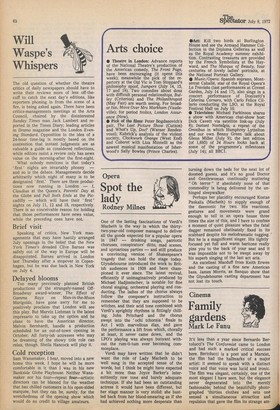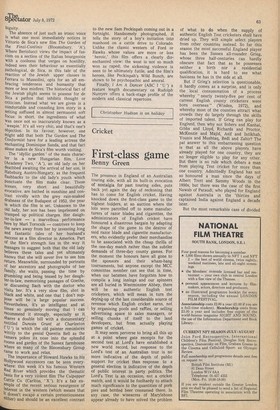Cinema
Family gardens
Mark Le Fanu
It's less than a year since Bernardo Bertolucci's The Conformist came to London and had such a marked critical success here. Bertolucci is a poet and a Marxist, the film had the hallmarks of a major artist: it seemed to speak with a distinct voice and that voice was lucid and ironic. The film was elegant, certainly, one of the most elegant I have seen, but the elegance never degenerated into the merely fashionable; behind the beautifully photographed 'thirties clothes and sets one sensed a simultaneous attraction and repulsion that gave the film its strange am The absence of just such an ironic voice is what one most immediately notices in Vittorio de Sica's new film The Garden of the Finzi-Continis (Bloomsbury, 'A'). Where Bertolucci views the impact of fascism on a section of the Italian bourgeoisie With a coolness that verges on hostility, Indeed sees their behaviour as essentially Pathological, de Sica, in this tale of the reaction of the Jewish upper classes in Ferrara to Mussolini, opts for an all embracing tenderness and humanity that more or less misfires. The historical fact of the Jewish plight seems to possess for de Sica a pathos that inhibits thought or criticism. Instead what we are given is a comfortable and consoling love story in a setting suffused in almost permanent soft focus: in short, the ingredients of what was once not so inaccurately known as a weepie.' It's all very chic, and that's one's Objection. In its favour, however, one might add that both The Garden and The Conformist have for a leading actress the enchanting Dominique Sanda, and that fact alone makes de Sica's film worth visiting. The 'idyllic garden' of the main character in a new Hungarian film. Love (Academy Two, A '), an old lady on her deathbed awaiting the arrival of her son, is Habsburg Austro-Hungary, as the frequent flashbacks to the old lady's youth which Punctuate the film make clear. These scenes, very short and beautifully evocative are bathed in sunshine and contrast vividly with the grey rain-soaked drabness of the Budapest of 1953, the year 111 which the film is set. Unknown to the Old lady, her son has been imprisoned on trumped up political charges. Her daughter-in-law — a marvellous performance here by Mari Torocsik — contrives to keep the news away from her by inventing long and fantastic tales of her husband's success as a film director in America. Part of the film's strength lies in the way it Manages to suggest both that the old lady believes these tales and yet ultimately knows that she will never live to see him return. Meanwhile, surrounded by portraits of her ancestors and photographs of her family, she waits, passing the time by grumbling and being teased by her daughter-in-law, memorising passages of Goethe, or discussing Bach with the doctor who visits her. It's a very slow film, shot in black and white, and one that I don't supPose will be a large popular success. Nevertheless, it's so intelligent and at times so genuinely moving that I can recommend it strongly, especially as it Shares a double bill with a documentary entitled Duncan Grant at Charleston C ') in which the old painter reminisces Wittily to the genial Quentin Bell as the camera pokes its nose into the splendid rooms and garden of the Sussex farmhouse Where so many of the Bloomsbury Group came to work and relax.
The importance of Howard Hawks to his Hollywood successors can be seen every Where: this week it's his famous Western Red River which provides the thematic basis for a very violent film The Culpepper
Cattle Co. (Carlton, X '). It's a fair ex
ample of the recent serious resurgence of !merest in the western (which means that
It. doesn't escape a certain pretentiousness either) and should be an excellent contrast
to the new Sam Peckinpah coming out in a fortnight. Handsomely photographed, it tells the story of a boy's initiation into manhood on a cattle drive to Colorado. Unlike the classic western of Ford or Hawks whose values are more or less ' heroic,' this film offers a clearly disenchanted view: the west is not so much won as raped; the sickening violence is seen to be ultimately futile, and the film's heroes, like Peckinpah's Wild Bunch, are shown to be psychopathic and amoral.
Finally, I Am A Dancer (ABC I ' U ') a feature length documentary on Rudolph Nureyev offers a back-stage profile of the modern and classical repertoire.











































 Previous page
Previous page